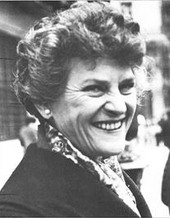Flora Lewis
(journalist) | |||||||||||||||||||||||||
|---|---|---|---|---|---|---|---|---|---|---|---|---|---|---|---|---|---|---|---|---|---|---|---|---|---|
 | |||||||||||||||||||||||||
| Born | July 25, 1922 Los Angeles, California, USA | ||||||||||||||||||||||||
| Died | 2002-06-02 (Age 79) Paris | ||||||||||||||||||||||||
| Nationality | American | ||||||||||||||||||||||||
| Ethnicity | Jewish | ||||||||||||||||||||||||
| Alma mater | Columbia University, UCLA | ||||||||||||||||||||||||
| Children | 3 | ||||||||||||||||||||||||
| Spouse | Sydney Gruson | ||||||||||||||||||||||||
| Member of | Trilateral Commission | ||||||||||||||||||||||||
American foreign correspondent during the Cold War. Trilateral Commission. Tri-Bilderberg
| |||||||||||||||||||||||||
Flora Lewis was an American foreign correspondent during the Cold War, working among others for the New York Times[1][2], who attended Bilderberg/1979, Bilderberg/1981 and Bilderberg/1984.
Background
Lewis was born into a Jewish family in Los Angeles. Her father Benjamin Lewis was a lawyer and mother Pauline Kallin a pianist. She graduated high school at the age of 15 and received a BA from the University of California at Los Angeles graduating three years later. She was also elected to Phi Beta Kappa and received her master's degree from Columbia University's School of Journalism in 1942 just before turning 20.[1]
Career
In 1942, Lewis joined The Associated Press (AP) in New York and Washington. In 1945, the AP sent her to London, where she married Sydney Gruson, a New York Times correspondent. For the next 20 years, she was based in London, Jerusalem, Prague, Warsaw, Geneva, Bonn, Paris and Mexico City. European publishers included The Observer, The Economist, the International Herald Tribune in Paris,[3] The Financial Times in London and France-Soir in Paris.[1] She and Gruson had three children: Kerry (born in Ireland), Sheila (born in Israel), and Lindsey (born in Mexico).[4]
“I am absolutely convinced that if the two things, the Hungarian Revolution and the Suez campaign, had not been simultaneous, the collapse of the Soviet empire would happened that year. It really was coming that near to it.”
Flora Lewis (1996) [5]
From 1956 to 1966, Lewis was a reporter for The Washington Post, where her work landed her on the master list of Nixon political opponents.
In 1966, Newsday published and syndicated her first column.[1]
In 1972, The New York Times appointed her foreign and diplomatic correspondent. The Times then had a rule against hiring wives of its correspondents, Lewis, however, contributed frequently to The New York Times Magazine and wrote for other publications.[4] She has the distinction of being the first woman to be given her own column on the New York Times op-ed page.[1]
Writing for the Jewish Women's Archive, Ari Goldman described her thus:
It was a kosher home where Jewish holidays were observed, one family member recalled, but Lewis retained little attachment to traditional Jewish life in her adulthood. In her dispatches she often showed sympathy for Israel, but also felt free to criticize the Jewish state when she thought its policies were wrongheaded."[6]
She died of cancer in Paris in 2002.[1]
Impact
For her obituary, the New York Times wrote:
Heads of government and ordinary readers in the United States and Europe, where she lived for much of her career, looked to Flora Lewis's columns not only for her access to people in high places, but also for the dogged reporting and the sophisticated analysis that resulted.[1]
Rupert Cornwell stated that "Lewis had formidable assets, starting with an access to those in power that often made her colleagues green with envy. More important, she possessed a mind that could cut to the essential of an issue with astonishing speed. To her writing she brought a clarity and analytical power that enabled her to explain complicated issues without ignoring all-important nuances."[7]
In 1971 she wrote on the CIA involvement in drug trafficking.[8]
By contrast, columnist Eric Alterman wrote that at the Times, Lewis "filed from Paris what was quite possibly the most boring regular column in the history of journalism," which "certainly contained no hint that the writer was a woman." The New Republic′s "World's Most Boring" headline competition was inspired by a Lewis column titled "Worthwhile Canadian Initiative."[9]
Writings
Flora Lewis wrote four books and contributed to a fifth.
- A Case History of Hope: The Story of Poland's Peaceful Revolutions (1958)
- Polish Volcano: A Case History of Hope (1959)
- Red Pawn: The Story of Noel Field (1965)
- The Man Who Disappeared: The Strange History of Noel Field (1966)
- Pion rouge: l'histoire de Noël Field (1967)
- One of Our H-Bombs is Missing (1967)
- Europe: A Tapestry of Nations (1987)
- Europe: Road to Unity (1992
- Avenir de la démocratie: un défi pour la société et l'Eglise (2000)
Events Participated in
| Event | Start | End | Location(s) | Description |
|---|---|---|---|---|
| Bilderberg/1979 | 27 April 1979 | 29 April 1979 | Austria Baden Clubhotel Schloss Weikersdorf | 27th Bilderberg, 95 guests, Austria |
| Bilderberg/1981 | 15 May 1981 | 17 May 1981 | Switzerland Palace Hotel Bürgenstock | The 29th Bilderberg |
| Bilderberg/1984 | 11 May 1984 | 13 May 1984 | Sweden Saltsjöbaden | The 32nd Bilderberg, held in Sweden |
References
- ↑ a b c d e f g https://www.nytimes.com/2002/06/02/world/flora-lewis-astute-observer-of-world-affairs-for-the-times-and-others-dies-at-79.html
- ↑ https://jwa.org/encyclopedia/article/lewis-flora
- ↑ https://www.smh.com.au/national/this-womans-place-was-everywhere-20020624-gdfe4l.html
- ↑ a b https://www.nytimes.com/1998/03/09/nyregion/sydney-gruson-81-correspondent-editor-and-executive-for-the-new-york-times-dies.html
- ↑ https://nsarchive2.gwu.edu/coldwar/interviews/episode-7/lowis3.html
- ↑ http://jwa.org/encyclopedia/article/lewis-flora
- ↑ https://www.jewishvirtuallibrary.org/jsource/biography/FLewis.html
- ↑ https://www.cia.gov/readingroom/docs/1971-07-14%20FACTS%20SURFACES%20ON%20THE%20HEROIN%20WAR.pdf
- ↑ https://books.google.com/books?id=AawSTuz4ldAC&q=%22most+boring%22
Wikipedia is not affiliated with Wikispooks. Original page source here